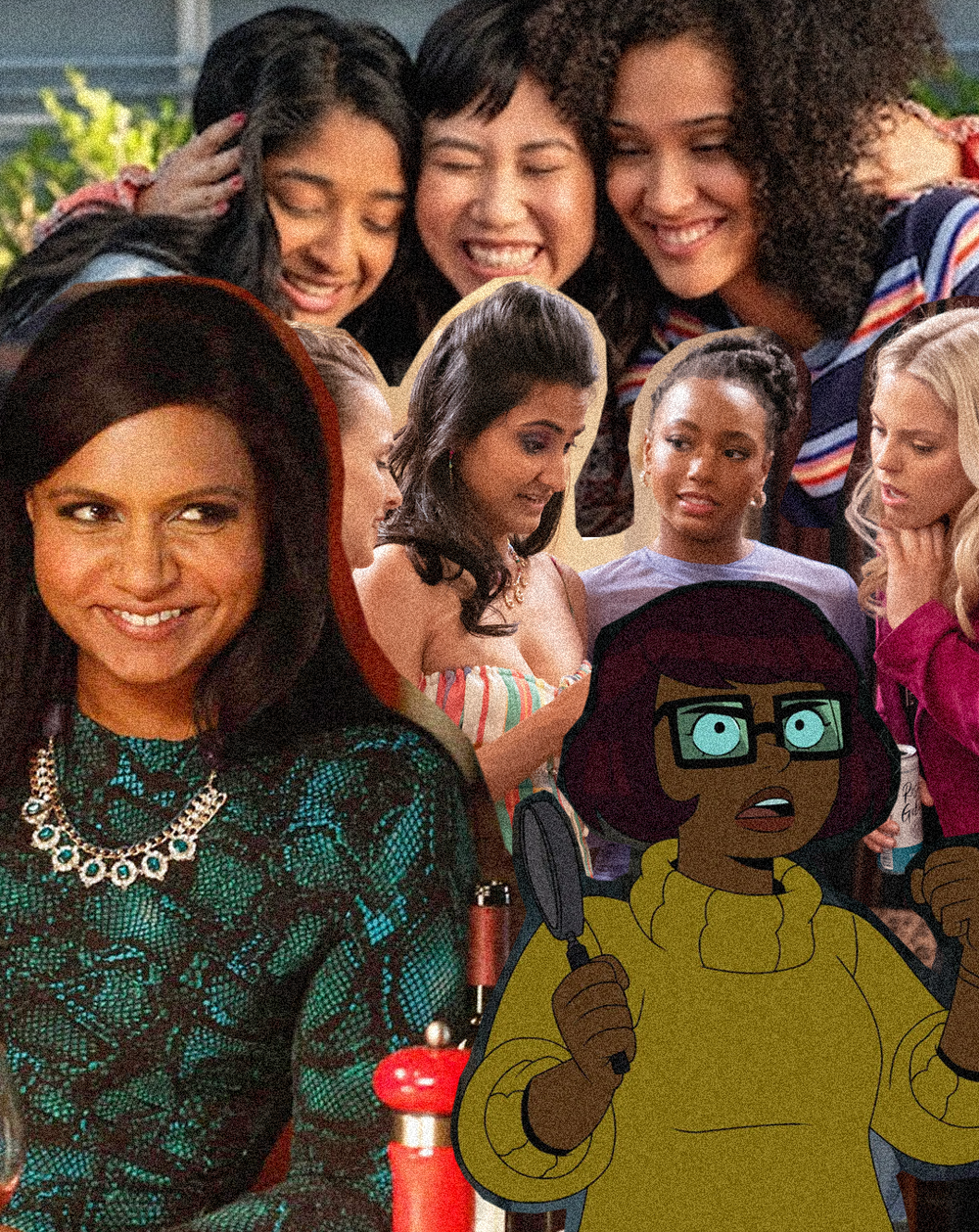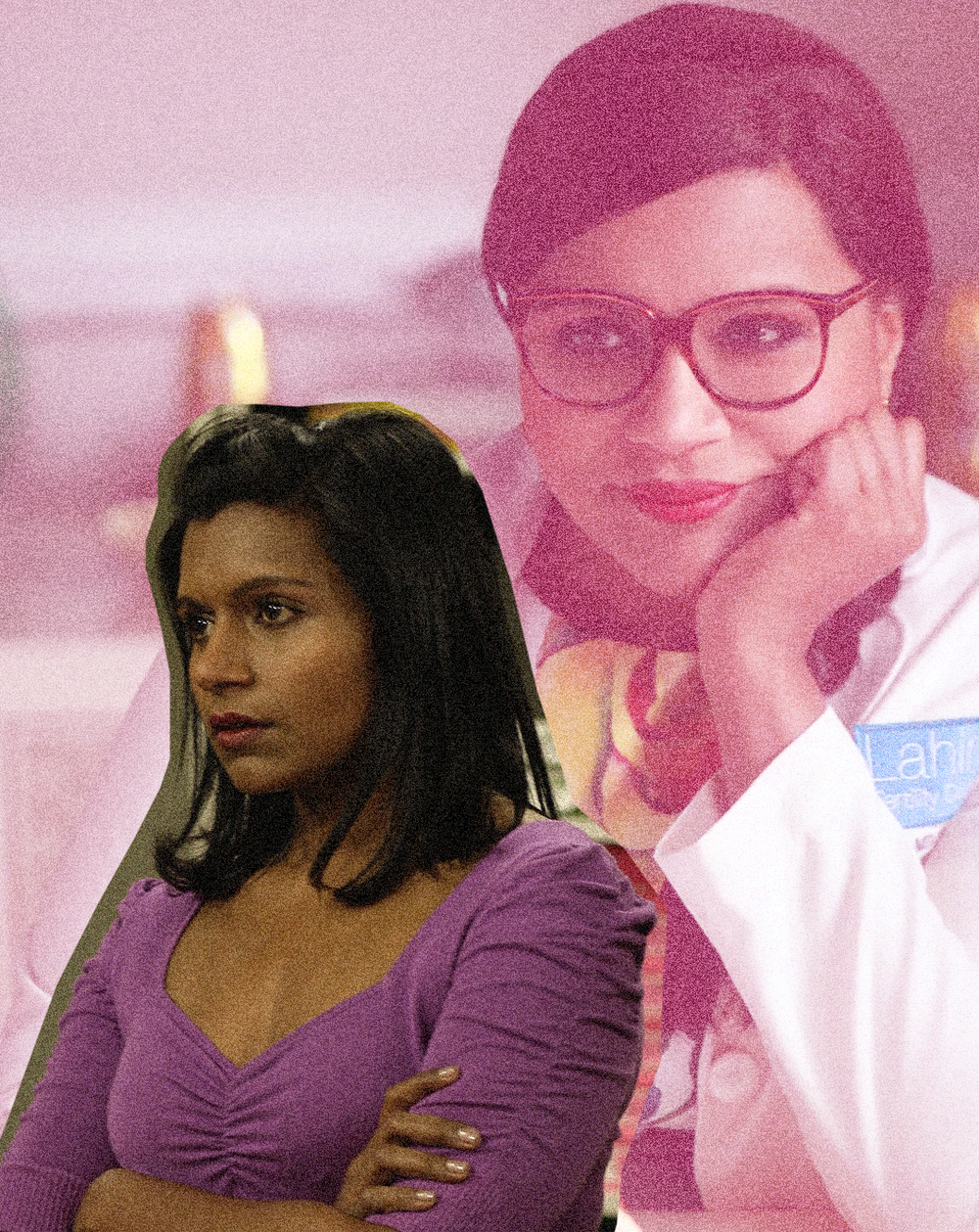We Need to Talk About Mindy Kaling
On January 12th of 2023, the animated series Velma was released on HBOMax. And ever since it was first aired, the new take on the Scooby-Doo Gang has caused havoc on all things teen related. From snarky innuendos about the #MeToo Movement to incredibly unrealistic self-protection gym classes— the show figures out a way to get worse over time. Yet, the part that really deserves a deeper analysis, may be Kaling’s need to make her representations of women of colour such a negative portrayal.
Kaling, the creator of Sex Lives of College Girls, The Mindy Project, and Never Have I Ever has often created content centering young Indian girls at the forefront. That sentence alone proves to be something empowering, an applause-worthy testimony as the entertainment industry has always prioritised the ever-so-flowing opened mouths of white cis-hetero men (and their nepo-baby officiates). Nonetheless, as we expand on that content and the characterisations of these protagonists of colour, I’m often left gutted by what they mean for young girls on an entire spectrum.
While Kaling didn’t write Velma, it is imperative that Kaling isn’t scapegoated for her choice to star in the animated series. The continued repetition of the ‘loser Indian girl who’s really only a loser because she’s Indian,’ trope is perpetuated in this series— a trope that has been interconnected with much of Kaling’s other works.
___STEADY_PAYWALL___
In Velma, the poor protagonist sulks on the floor in the first episode, stricken with embarrassment as her attempt to ‘distract’ the student body with her mini-skirt has been deadlined because she will always be the ‘loser Indian girl.’
In the second season of Sex Lives of College Girls, Bela is ‘cancelled’ for using her platform as the chairman of a female-based comedy committee to gatekeeper other women that she may not find unny. She’s also guilty of using sex as a tool to move her closer towards opportunities, and overall, she’s blames her hypersexuality on the behalf of her strict Indian household and ‘loser’ stature in high school.
Lastly, in Never Have I Ever, many of the actions Devi makes: starting a scandalous rumour about Aneesa in season two, and stereotyping Des as the ‘Indian nerd’ before meeting him are tied to her internalised racism against her culture. In all of these protagonists, there’s this sort of vengeful spirit against their culture’s customs. The impulsive decisions they make are on the backing of being a person of colour and attempting to oppose their cultural upbringings.
It would be coincidental if one of these characters were an archetype to have such internalised hatred against their culture. Yet, when this pattern of self-hated and blame-shifting towards non-white heritage is made so abundant, it expands beyond the writing and goes back to the writer. So yes, we need to talk about Mindy Kaling.
Mindy Kaling, an immensely powerful producer in the television industry is creating work that points fingers back at non-linear customs. Mindy Kaling, an immensely powerful writer, comedian, and actress, is creating work centering girls that would rather absolve themselves of the culture they belong to in order to assimilate into the white nay-sayer world around them. In Velma, the female protagonist continues to keep Daphne— one of her main love interests— at the end of the string as she is heavily attracted to Fred, the teenage boy who can’t fathom remembering her name originally because she’s not ‘hot’.
In Never Have I Ever, the endgame pairing of Devi and Ben is supposed to outlast Paxton or Des, yet the majority of his character arc has been surrounded by trying to be better than her. As if the number of insults and back-handed compliments Ben has given can be triumphed by simple acts of courage.
In Sex Lives of College Girls, this constitution of assimilation is seen across Bela and Whitney, another character of colour. Bela falls for Eric, a paralleled universe version of Ben, who makes his inability to tolerate her extremely noticeable. Bela jumps through several hoops to keep his attention while he does the bare minimum. Whitney, in the second season, finds herself attracted to a classmate in her biology class— the same classmate who’s berated, undermined and belittled her intelligence and abilities. All of these moments where he’s demeaned her value is excavated because of his ability to take off his shirt.
“They, young audience members, young women of colour— these female characters of colour even— should know they hold the sunlight to make flowers grow from dark attics. That’s representation.”
Whitney also runs away from her heritage of sorts, as if she’s not allowed to be proud that her mother, a Black woman, has obtained such a dominant role in politics. Especially since the opportunities for Black women in political circles of change are quite scarce. Leighton, a white, upper class character, doesn’t feel guilty about the rooms she inhabits because of her privilege, but Whitney pushes back against the privilege she has managed to acquire. While simultaneously says ‘yes’ to the racial fetishisation she receives from her white Coach, and says ‘yes’ to the classmate who timelessly insults her.
What exactly does this teach young girls of colour? As both Never Have I Ever and Sex Lives of College Girls are some of the only present media that follow young girls, especially young girls of colour— many viewers will press play because it's been marketed to them that they’re being seen. They’ll be represented by the reflection of adjacent skin complexions on screen and find themselves in a puzzling experience of self-hatred and jealousy.
It’s not that Kaling is forced to play a role model, or the good samaritan of the entertainment industry because of her race, but this sentiment of such tragic female protagonists of colour invites the audience in to judge her merits. Who are these shows for then?
Yes, maybe Devi, Velma, Bela, and any other female characters Kaling created didn’t sign up to be role models either— they’re making human mistakes, and they’re learning as all young adults do when transitioning into the mature world. Nonetheless, young viewers should be able to hold hands with characters that are learning to love themselves regardless of how others may disagree. They should know they have all the room to blossom. They, young audience members, young women of colour— these female characters of colour even— should know they hold the sunlight to make flowers grow from dark attics. That’s representation.
Words: JoliAmour DuBose-Morris


